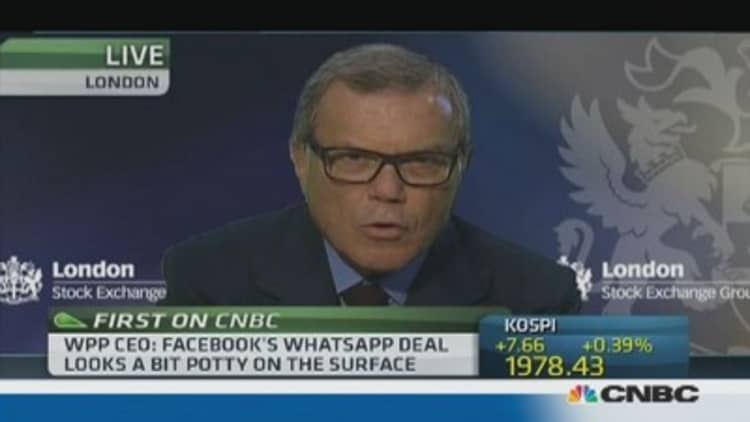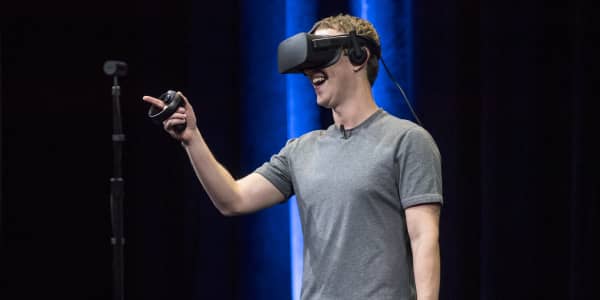For all of Facebook's success in turning its mobile unit into a booming business, there's one thing it can't seem to shake: bad user ratings.
In Apple's App Store, consumers give the current version of Facebook a rating of 2.6 stars out of five, which is better than their 1.9-star assessment of Facebook Messenger. Among the current top 30 free iOS apps, nothing else gets fewer than three stars.
Spotify has a 4.8 rating, and Pinterest and Google Maps get 4.5 stars. Pandora is rated 3.8 and Twitter 3.6.
The story is marginally better for Facebook on Android. In Google's Play Store, Facebook Messenger gets 3.9 stars out of five, and the flagship app gets four. They would be the two lowest-rated free apps among Android's top 30 if not for Zynga's game, "New Words With Friends," which also has a four-star rating,
(The data on iOS was pulled from analytics provider App Annie and from the Play Store's website for Android.)
Read MoreFacebook Q3 takeaway
Reviewers' complaints about Facebook range from the company's algorithmic arrangement of its news feed and abundance of sponsored content to the app's propensity to crash or its slow load time. There's also a healthy dose of antipathy toward Facebook's decision earlier this year to separate Messenger from the main app.
None of this has mattered much for Facebook's financials or its stock price. The Menlo Park, California-based company reported third-quarter sales growth on Tuesday of 59 percent to $3.2 billion.
The stock is on a tear, up 48 percent this year to $80.77 as of Tuesday's close, before slumping in extended trading on a disappointing fourth-quarter forecast.
What investors care about more than user ratings is that consumers continue to join the service and those who are signed on keep coming back, said Aaron Kessler, an analyst at Raymond James in San Francisco.
"It's engagement that matters," said Kessler, who has the equivalent of a "buy" rating on the stock. "Engagement has been strong this year."
In the third quarter, Facebook had 864 million daily active users worldwide, up from 829 million in the prior period. Mobile accounted for the bulk of that, with the number of users increasing to 703 million from 654 million. This from a company that just two years ago was watching its stock price plunge on concern that it wouldn't be able to transition its business from the Web to smartphones.
Read MoreZuckerberg: People underestimate Facebook
So how much do consumer reviews matter? Unlike many lesser-known apps, Facebook's ubiquity means that it doesn't need promotion in the app stores to get discovered and generate downloads. And people want to be where their friends are, making Facebook a difficult place to leave.
But there could very well be future repercussions to testing the patience of users. The younger generation is already shifting to services like Snapchat (3.4 stars on iOS, 4.1 on Android). New social apps are popping up by the day with a focus on mobile design and simplicity, so Facebook's long-term dominance can hardly be taken for granted.
One particularly thorny issue is that in order to please shareholders, Facebook has to boost ad sales, which requires thrusting more promotions on to small screens. Should annoying ads start to push consumers away, marketers will find other places to spend their dollars.
Read MoreHow the big four tech companies stack up
"If consumers aren't delighted by the experience, does that flow over to their receptivity to advertising?" said Dan Slivjanovski, a senior vice president at Web advertising company Blinkx. "That's a logical question."
It's not happening yet. According to eMarketer, Facebook will capture 68 percent of ad spending on social networks in 2014 as well as in each of the next two years.
A Facebook spokesperson declined to comment.
In previous versions, Facebook has rated better with consumers. According to App Annie, the average rating for all versions of the main iOS app is 3.7 stars and for Messenger is 3.2.
While the latest iterations face a barrage of criticism, the mobile companies acquired by Facebook have created some of the most beloved apps on the market. Instagram, the photo app that Facebook bought in 2012 for close to $1 billion, gets 4.2 stars on iOS and 4.5 on Android. WhatsApp, the messaging service that cost Facebook $19 billion this year, is rated 3.9 on iOS and 4.4 on Android.

Neither Instagram nor WhatsApp have generated much by way of revenue, so Facebook still has to decide how they will be moneymakers. Instagram started rolling out sponsored content a year ago from brands including Ben & Jerry's, General Electric and PayPal. The company says on its website that, "Our aim is to make any advertisements you see feel as natural to Instagram as the photos and videos many of you already enjoy from your favorite brands."
WhatsApp's sales have come from charging consumers $1 a year after their first free year of use. The company will likely add the ability to place voice calls over its Web service.
Sterne Agee analyst Arvind Bhatia expects WhatsApp to contribute sales of $344 million next year and almost double that in 2016, while Instagram is showing "significant monetization potential."
With Facebook investing heavily in mobile, more features to its core app are on the way. Look for the company to make it easier to buy popular clothes and gifts with a mobile checkout service, and Facebook is working to improve mobile links so consumers can quickly hop over to their favorite apps and discover new ones.
Read MoreGoogle's Achilles' heel that start-ups are attacking
"Facebook has made it clear it wants to be the very fabric of the mobile ecosystem," Bhatia wrote in an Oct. 27 report.
Consumers can only hope it's a fabric that they're less inclined to rip apart.





